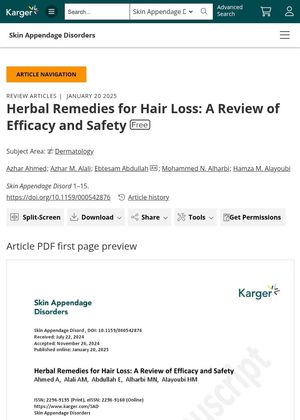Herbal Remedies for Hair Loss: A Review of Efficacy and Safety
January 2025
in “
Skin Appendage Disorders
”

TLDR Herbal remedies may help hair growth, but more research is needed.
The review article explores the efficacy and safety of herbal remedies for hair loss, highlighting their potential benefits in promoting hair growth and treating conditions like androgenetic alopecia, telogen effluvium, and alopecia areata. These remedies work through mechanisms such as 5α-reductase inhibition, increased microcapillary blood flow, and modulation of hair growth signaling pathways. However, the studies reviewed often have limitations, including small sample sizes, short treatment durations, and lack of long-term follow-up. Consequently, the article calls for more well-designed randomized trials with larger sample sizes to confirm the efficacy of these herbal remedies.





